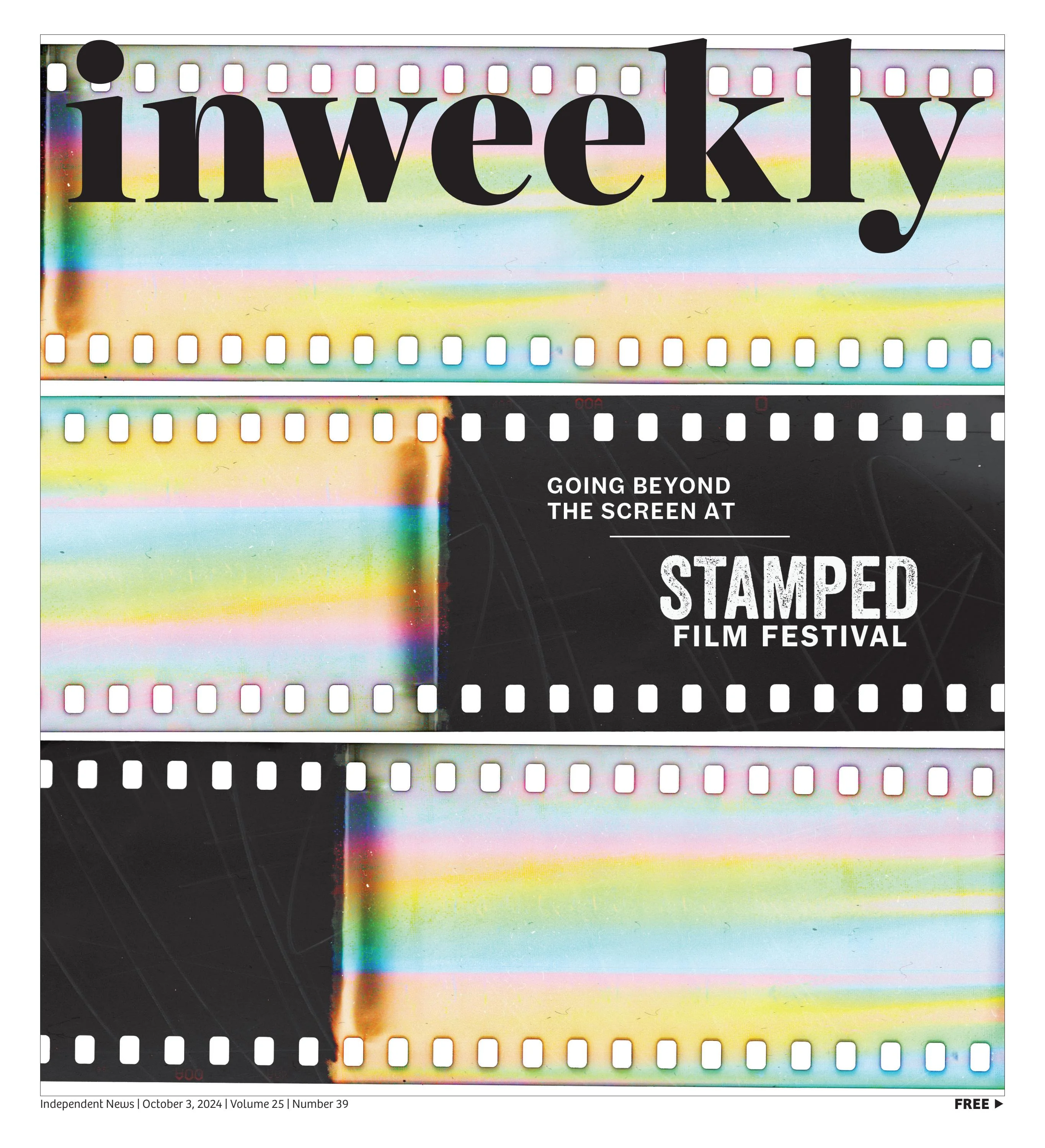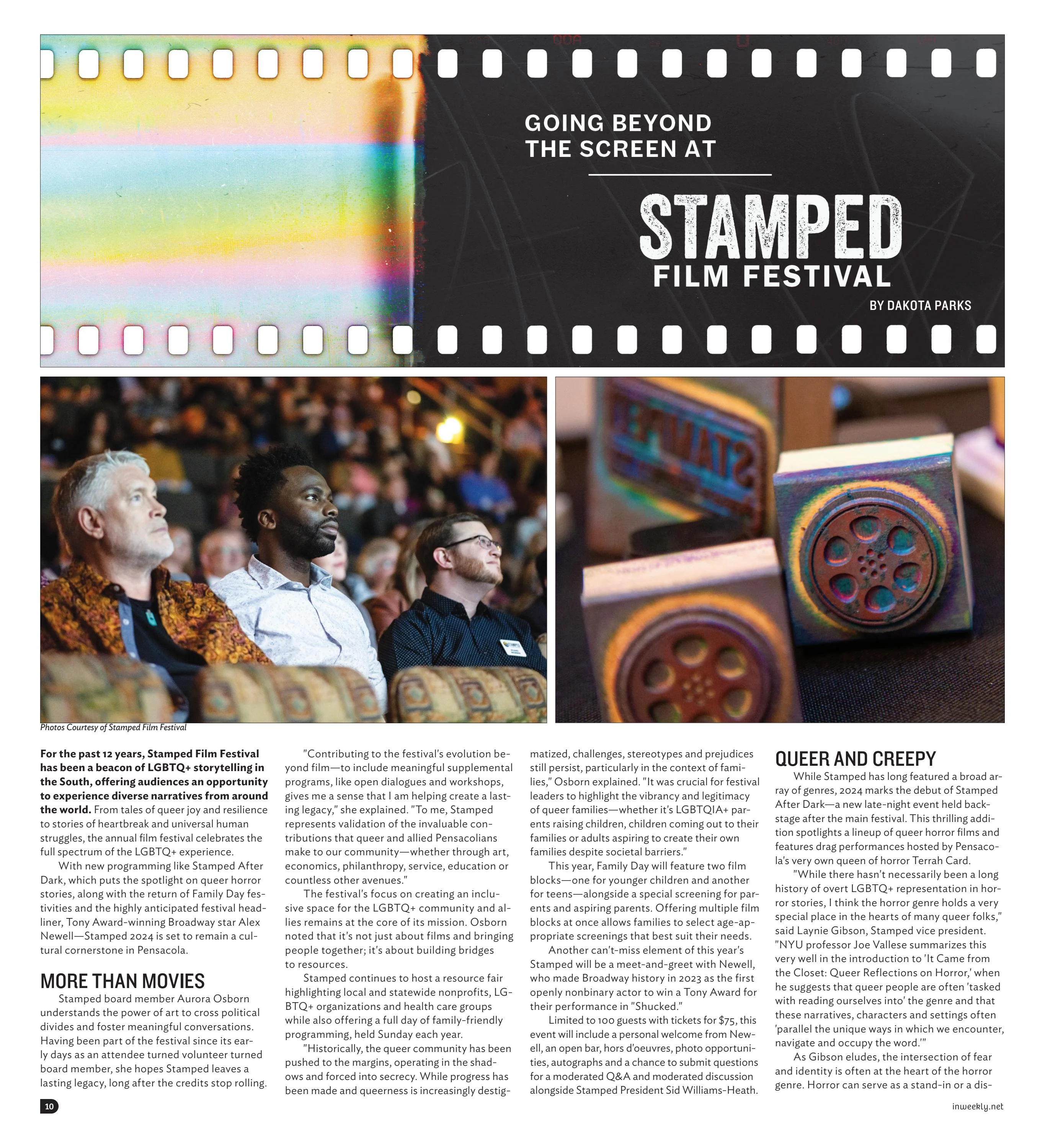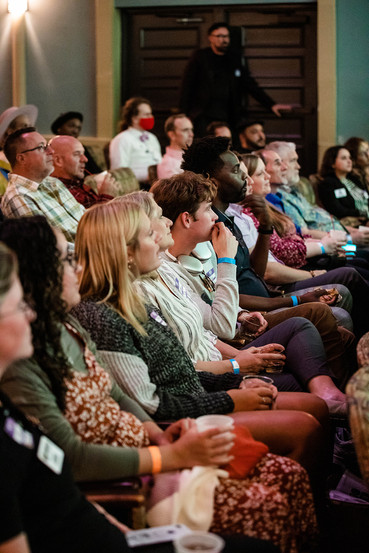By Dakota Parks for Inweekly
For the past 12 years, Stamped Film Festival has been a beacon of LGBTQ+ storytelling in the South, offering audiences an opportunity to experience diverse narratives from around the world. From tales of queer joy and resilience to stories of heartbreak and universal human struggles, the annual film festival celebrates the full spectrum of the LGBTQ+ experience.
With new programming like Stamped After Dark, which puts the spotlight on queer horror stories, along with the return of Family Day festivities and the highly anticipated festival headliner, Tony Award-winning Broadway star Alex Newell—Stamped 2024 is set to remain a cultural cornerstone in Pensacola.
More than Movies
Stamped board member Aurora Osborn understands the power of art to cross political divides and foster meaningful conversations. Having been part of the festival since its early days as an attendee turned volunteer turned board member, she hopes Stamped leaves a lasting legacy, long after the credits stop rolling.
“Contributing to the festival’s evolution beyond film—to include meaningful supplemental programs, like open dialogues and workshops, gives me a sense that I am helping create a lasting legacy,” she explained. “To me, Stamped represents validation of the invaluable contributions that queer and allied Pensacolians make to our community—whether through art, economics, philanthropy, service, education or countless other avenues.”
The festival’s focus on creating an inclusive space for the LGBTQ+ community and allies remains at the core of its mission. Osborn noted that it’s not just about films and bringing people together; it’s about building bridges to resources.
Stamped continues to host a resource fair highlighting local and statewide nonprofits, LGBTQ+ organizations and health care groups while also offering a full day of family-friendly programming, held Sunday each year.
“Historically, the queer community has been pushed to the margins, operating in the shadows and forced into secrecy. While progress has been made and queerness is increasingly destigmatized, challenges, stereotypes and prejudices still persist, particularly in the context of families,” Osborn explained. “It was crucial for festival leaders to highlight the vibrancy and legitimacy of queer families—whether it’s LGBTQIA+ parents raising children, children coming out to their families or adults aspiring to create their own families despite societal barriers.”
This year, Family Day will feature two film blocks—one for younger children and another for teens—alongside a special screening for parents and aspiring parents. Offering multiple film blocks at once allows families to select age-appropriate screenings that best suit their needs.
Another can’t-miss element of this year’s Stamped will be a meet-and-greet with Newell, who made Broadway history in 2023 as the first openly nonbinary actor to win a Tony Award for their performance in “Shucked.”
Limited to 100 guests with tickets for $75, this event will include a personal welcome from Newell, an open bar, hors d’oeuvres, photo opportunities, autographs and a chance to submit questions for a moderated Q&A and moderated discussion alongside Stamped President Sid Williams-Heath.
Queer and Creepy
While Stamped has long featured a broad array of genres, 2024 marks the debut of Stamped After Dark—a new late-night event held backstage after the main festival. This thrilling addition spotlights a lineup of queer horror films and features drag performances hosted by Pensacola’s very own queen of horror Terrah Card.
“While there hasn’t necessarily been a long history of overt LGBTQ+ representation in horror stories, I think the horror genre holds a very special place in the hearts of many queer folks,” said Laynie Gibson, Stamped vice president. “NYU professor Joe Vallese summarizes this very well in the introduction to ‘It Came from the Closet: Queer Reflections on Horror,’ when he suggests that queer people are often ‘tasked with reading ourselves into’ the genre and that these narratives, characters and settings often ‘parallel the unique ways in which we encounter, navigate and occupy the word.’”
As Gibson eludes, the intersection of fear and identity is often at the heart of the horror genre. Horror can serve as a stand-in or a distraction from real-life monsters—the monstrosity of human cruelty, discrimination and societal prejudice. Navigating an LGBTQ+ identity can sometimes feel terrifying, especially with an upcoming election and political apparatus that threatens transgender lives and queer rights. Horror offers a space to confront and reclaim the terrors we face.
“I’m thrilled Stamped is creating the space for queer storytellers to share their overtly queer horror stories and that we can create an exclusive experience centered around those in our community who love all things queer and creepy,” they continued. “At Stamped After Dark, we don’t have to covertly sneak ourselves into the story after the fact. We’re creating it together.”
After years of dreaming of an After Dark event, the stars aligned for the board and festival programmer Chris McNeany, to feature four diverse short films that explore the many facets of queer horror—from the dramatic to the campy and comedic. The After Dark experience will take place backstage, complete with its own bar and spooky vibes.
Once the films stop rolling, Card will take the stage, intertwining drag and horror to curate an unforgettable show. Card is also a horror aficionado who has drawn inspiration from films. She credits the 1977 Japanese film “House” specifically as a significant influence on her style in and out of drag.
“What I love about horror is that it brings people together,” Card shared. “I remember huddling around the couch with friends and just having a moment that we experienced together. Whether it was a ridiculous horror movie that made us laugh or something that made us want to stay up with the lights on, horror has always been a moment that brought friendships closer.”
This bond between horror and friendship also inspired her horror-comedy podcast Stay On the Line. Born out of the isolation of the pandemic, Card hosted over 110 episodes alongside friends and fellow drag entertainers, reviewing and discussing contemporary, queer-horror films, like “Bodies Bodies Bodies,” “The Perfection” and “The Boulet Brothers’ Dragula” as well as classic queer-coded horror films.
“A lot of queer people can identify with the villains in horror movies too. Many horror villains are outcasts or ‘othered’ in some type of way, and queer people can really relate to that—not being deemed what is considered normal, being shut out from the world or generally misunderstood,” Card shared. “Leatherface is a great example of a queer horror icon who puts on makeup and a wig, and is just different, who is actually abused by his family members. Many people can resonate with stories like that.”
Celebrating Diversity Amid Division
As Stamped continues to thrive, its commitment to remaining a free festival for all underscores its deeper responsibility in today’s political climate. Just as the horror genre pushes boundaries and explores the darker implications of the human experience, festival organizers hope Stamped can serve as a platform to bridge divides.
“It is more important than ever for citizens to be politically informed, to actively explore multiple viewpoints and to lead with curiosity and respect when engaging with perspectives that differ from their own. A pluralistic society thrives when we engage in dialogue rather than retreat into echo chambers,” Osborn articulated.
Artistic expression, particularly through the films showcased at Stamped, serves as a powerful tool in this endeavor. With its unwavering commitment to sharing these stories, Stamped has cemented itself in the community and made it clear that the festival is here to stay. Yet, as Osborn explained, Stamped still faces a barrage of anger and hostility in response to its online marketing efforts and social media posts celebrating queer joy—a stark reminder to organizers that queerphobia is alive and well.
“Free speech, particularly through art, challenges us to see the world through someone else’s eyes, to question our assumptions and to grow in our understanding,” Osborn adds. “At a time when differences are often used to divide us, Stamped is a reminder that those differences—whether in identity, opinion or experience—can instead be opportunities for growth and learning, to unite us and to strengthen our local community.”
Going Beyond the Screen
WHAT: An annual event that highlights LGBTQ+ films and filmmakers
WHEN: Friday, Oct. 4-Sunday, Oct. 6
WHERE: The Clark Family Cultural Center, 400 S. Jefferson St.
COST: Free, but advance registration is required
DETAILS: stampedfilmfest.com, @stampedfilmfestival
Friday, Oct. 4 doors open at 5 p.m. and films run until 8:30 p.m.
Saturday, Oct. 5 doors open at 11:45 a.m. and films run until 9:30 p.m.
Sunday, Oct. 6 doors open at 1 p.m. and films run until 5 p.m.
STAMPED AFTER DARK
WHAT: An after-hours experience featuring queer horror content and drag performances
WHEN: 8:45 p.m. Friday, Oct. 4
COST: $10
STAMPED COCKTAIL RECEPTION WITH ALEX NEWELL
WHAT: A meet-and-greet with Tony Award-winner Alex Newell
WHEN: 5 p.m. Saturday, Oct. 5
COST: $75
*As part of our Stamped coverage, Inweekly also interviewed Ariel Mahler, an award-winning writer and director whose film “Re-Entry” will be screening at the festival. Click here to read that Q&A.








